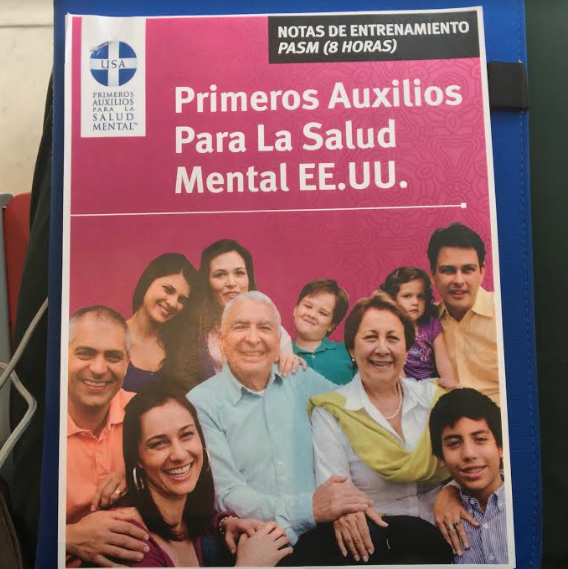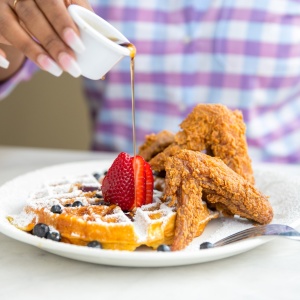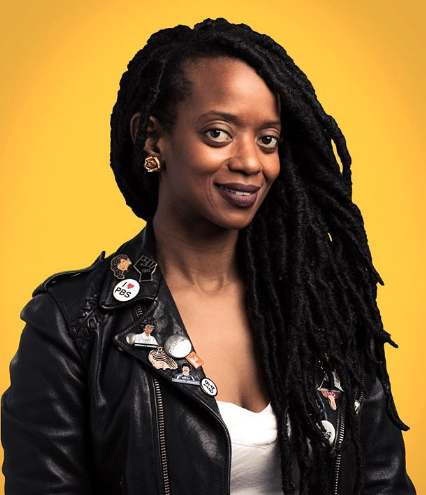Greetings, Earthling. Welcome to another round of Mental Health Monday, your weekly dose of stories, resources, and motivation for your everyday life. On the last roundup, we shared some goodness about singer Laura Mvula's journey with anxiety, a documentary on the mental health of college students by a Howard University student, a psychologist who prescribes books over pills, and much more. Have a gander.
If you missed #GetSomeJoy: A Blackstravaganza for Mental Health Awareness, here's a recap of what had happened that night.
THIS WEEK'S GOODNESS:
I’m A Pastor Who Refuses To Pray Black Trauma Away
As faith leaders, we can set a powerful example by preaching from our own experience. I have spoken openly about my battles with depression, and how I turned not only to my faith but to mental health professionals for help. Telling my story to congregants, colleagues, and friends has helped others feel comfortable doing the same, and helped them have the courage to seek treatment.
"America Keeps Criminalizing Autistic Children" by David M. Perry [Pacific Standard]
Why would a school cop in Florida throw a slender, autistic fourth-grade student to the ground? You might assume that the child must have presented some kind of serious threat to himself or others, that other skilled experts had already tried de-escalating interventions, and that there was no other choice. Such was not the case for 10-year-old Seraph Jones. This spring, a school cop threw him down and held him against the ground with sufficient force to cause rug burn.
It turns out that Seraph's worst day at school—so far—happened because he was clicking a key too loudly, then ended up trapped in a situation where he had no good way to safely calm down.
"Just Give It 7 Seconds" by Leah Beckman [Jezebel]
Do not, under any circumstances, think about any interaction you’ve had with another human being for longer than seven seconds. So you got weird at your office Christmas party. Give it a full seven seconds, and release it.
"Broken Dreams And Financial Illusions: The Secret Depression Of Black Men" by Dr. Marcus Bright [HuffPo]
There is a secret depression that is rooted in economics that many Black men battle. It is hidden underneath an assortment of layers including an exaggerated bravado, drug and alcohol abuse, misdirected anger, and other forms of destructive behavior. Fantastical illusions are also a tool that is deployed to cope with the humbling realities of an often marginalized existence.
The “Bow Wow Challenge” that took over social media earlier in the month was a reflection of a daily pattern of illusions for many. Some aspect of Bow Wow fronting like he was traveling on a private plane instead of his actual reality of flying coach on a commercial airline is frequently in operation for Black people in this country.
"This New App Could Revolutionise Mental Health Care In The Black Community" CherryCasey [Buzzfeed]
Sait has launched Recovr – an app that helps young black adults (ages 18-35) with mental health problems seek professional treatment from black therapists and counsellors. The service also offers subsidised treatment to eligible users, depending upon their income and the severity of their mental health concerns.
Rapper Waka Flocka Flame sat down with Dr. Siri Sat Nam Singh to talk about his life, his struggles, losing his brothers and friendships, and self-medicating with weed and pills.
"Jail Creates Mental Health Woes for Black Men" [Black Health Matters]
Researchers from the University of Michigan, Rutgers University and Texas A&M found an association between African-American men with a history of incarceration and adverse mental health issues. For the purposes of the study, published in the Journal of Racial and Ethnic Health Disparities, those issues were defined as psychological distress and depressive symptoms.
Compared to other African-American men, those who have been imprisoned have 14 percent, 13 percent and 16 percent higher severity of depression, distress and discrimination, respectively.
"The Secret to My Success? Antidepressants" by Juliana Fierro
A few months ago, I gave a reading at a local bookstore. A small but enthusiastic crowd attended, and I confessed to the audience filled with emerging writers that I had, in my 20s and early 30s, stopped writing for eight years, and that I had accepted I’d never write again. Then someone asked, “How did you return to writing?”
I decided to tell the truth: Zoloft.
"I Got Something To Tell You...Coming Out To Bae About Mental Illness" by Tia Brown [Cassius Life]
So when do you come out of the closet?
The answer won’t be the same for every situation but a good indicator is when you’re starting to feel like your history is a secret you work at hiding. The reality is you may never be “ready” to share, but this isn’t just about you. The time to disclose should be determined by the level of emotional and physical intimacy your are developing with the other individual.
"If You Have An Anxiety Attack And No One Is Around To Hear It, You Still Make A Sound" by Erica B [HuffPo]
Almost every moment that I’ve disclosed my disorder to anyone, with the exception of my parents, close friends, and my therapist, has felt like this one. I have been made to feel as if I’m imagining my panic attacks, by people I once held near. I’ve been told that I need more church, more sleep, more things to “do.”
My anxiety makes me feel noiseless to others like I don’t rattle or shake for reason or no reason at all. It makes me feel invisible, as folks point their fingers and strikethrough my words.
Are you a Black mental health professional? Do you know one? Alex is building a hub for Black wellness. Learn how you can be down.






























